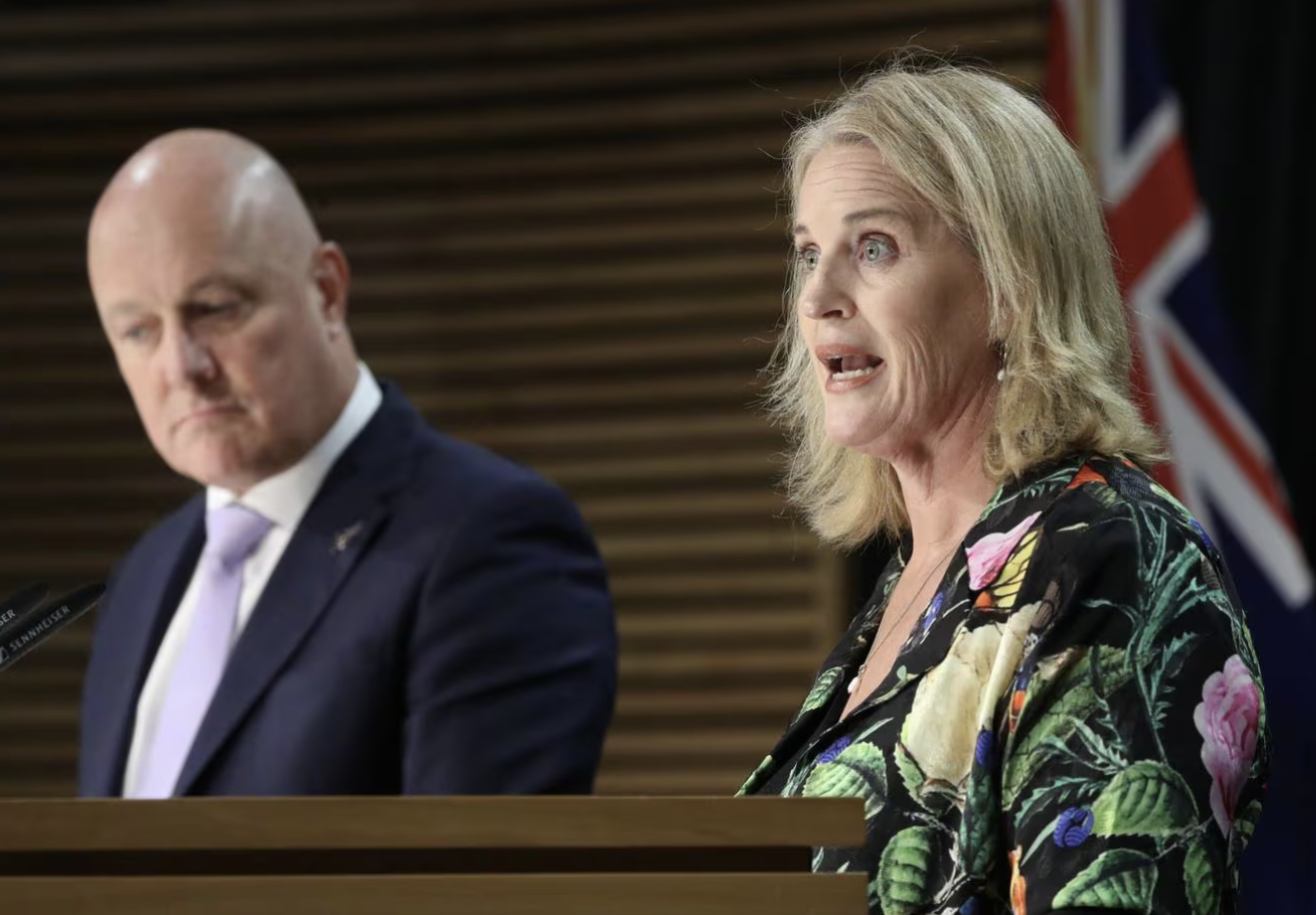Prime Minister Christopher Luxon has announced a “reset” of the welfare system, promising a return to a more strict regime of benefit sanctions.
A sanction means someone’s benefit gets reduced or cut if they do not comply with certain expectations like attending job interviews.
Addressing media at today’s post-Cabinet news conference, Luxon referenced his state of the nation speech yesterday, saying his warnings of tough decisions being required of his government were necessary.
He bemoaned how young people could remain on the jobseeker benefit for decades, saying National had inherited a country in decline.
Social Development Minister Louise Upston announced the changes alongside him and complained that under Labour, the number of sanctions “nose-dived”.
“In 2017, 60,588 sanctions were applied to beneficiaries who did not comply with their obligations to prepare and look for work. That nosedived to 25,329 in 2023. Over that time, people on jobseeker benefits increased by about 70,000 and about 40,000 more people have been receiving this support for a year or more,” she said earlier in a statement.
Attacking former Social Development Minister Carmel Sepuloni, Upston said the “previous minister set the tone for a lighter touch to benefit sanctions by saying they needed to be used ‘sparingly’ and as a ‘last resort’, dampening their effectiveness as an incentive to fulfil work obligations”.
Upston said she had written to the chief executive of the Ministry of Social Development “to make this Government’s view clear that we want to see all obligations and sanctions applied. If job seekers fail to attend job interviews, to complete their pre-employment tasks, or to take work that is available, then there needs to be consequences”.
She also announced that from June, the Ministry will “begin work check-ins for job seekers who have been on benefit for six months, particularly young people”.
“These check-ins will make sure job seeker beneficiaries are taking appropriate steps to find employment and are receiving the right help,” she said.

Under the existing sanctions, if a person did not meet work preparation obligations without a “good and sufficient reason” their benefit would be reduced by 50 per cent for four weeks. After a second breach, that would extended to 13 weeks for someone with dependent children, or suspended altogether if they did not have children.
Labour kept the ability to sanction beneficiaries who did not meet their work obligations, but on average sanctions were used at about a third of the rate as under National, as a percentage of the number of those on the Jobseeker benefit.
There were about 12,000 sanctions applied to people on Jobseeker benefits in the quarter before Labour came into government in 2017. This remained relatively steady until the beginning of the pandemic in 2020, when they plummeted as the Ministry of Social Development adopted a much-less punitive approach. Sanctions have increased since the end of 2020, with the latest June quarter at 6243 - roughly half the number under National.
Upston told media the work check-ins starting in June would result in about 2500 people per month having a “work-testable activity” which MSD could look at to assess whether those on the unemployment benefit were trying to find work or make themselves more employable.
Action would be taken against beneficiaries who showed a pattern of non-compliance with their obligations.
She said she didn’t believe it was fair to let beneficiaries become accustomed to a “life of handouts”, noting that wasn’t fair on taxpayers either.
Upston said the existing sanctions regime wouldn’t be changed now but the message had been sent to MSD to start using them more if beneficiaries weren’t complying with obligations.
She confirmed National’s commitment not to change the Child Poverty Reduction Act, which included the government’s goals around reducing the number of children living in poverty.
Luxon said there was “great evidence” for the need for further use of benefit sanctions, citing the dropping use of sanctions, rising number of beneficiaries and more time spent on the unemployment benefit.
The Welfare Expert Advisory Group, established in 2018, found the use of harsher sanctions didn’t lead to a significant increase in people going into work, instead it drove worse outcomes for those people. Asked whether the number of sanctions applied in 2017 (60,588) was a target, Luxon said “it would be a good start” but didn’t say whether it was a hard target.
“It’s about principles,” Luxon said when challenged on how advice from an expert welfare group said harsh sanctions were not so effective.
National campaigned on a three strikes policy, under which those who breached their obligations to prepare for or look for work three or more times would face sanctions. The proposed sanctions included cuts to their payments, suspension of their benefit, community work experience or Work and Income acting as their money manager.
It proposed using a traffic light system under which those with one or two breaches of their obligations (orange) would get extra requirements and targeted support, such as more frequent check-ins or job workshop attendance. Those with three or more were in the red setting, and those who met all their obligations were green.
It would also require jobseekers to reapply for the benefit every six months, and to provide documents showing they had applied for jobs and attended interviews to be able to continue receiving the benefit. It also proposed a one-month benefit stand-down for people evading arrest warrants.
Labour has argued the sanctions are ineffective and make child poverty worse, and instead it had relied on programmes to get people back into work.
Labour also removed some sanctions – including on sole parents who refused to name the other parent of their child, and sole parents who had another child while on the sole parents benefit.
Clock ticks on Government’s 100-day plan
Prime Minister Christopher Luxon has just three weeks to tick off the remaining items of his 100-day plan. This week, Parliament will continue debating the government’s decision to trim the annual increases in benefit levels. Those changes will mean someone on a disability benefit getting more than $2000 less in 2028 than they would have received under Labour’s plan.
In his state of the nation speech on Sunday, Luxon promised further changes, hinting at reform of the benefit sanctions regime.
He noted New Zealand’s declining numeracy and school attendance rates, an unwell healthcare system, and an increasing number of Kiwis on an unemployment benefit. “We’ll do everything we can to help people into work, but if they don’t play ball the free ride is over,” he said, drawing loud applause from the largely older crowd.
Luxon described these as “tough choices” that would get young people off a benefit and into a job.
“Because 24 years languishing on welfare means no hope. It means no opportunity. It means no dignity from work. I haven’t met a single young Kiwi whose ambition, creativity, and spark would be best served by a life on a benefit. So, I will not apologise for tough love.”
A briefing to the incoming Social Development Minister, published this month, showed people receiving Jobseeker support increased to 181,509 people by last September, 11,472 more than the year before.
After his speech, Luxon told reporters New Zealand would always have a welfare net to support those in need and while he acknowledged most on an unemployment benefit fulfil the requirements, he wanted to make sure everyone’s “holding up their obligations”.

'Politics of cruelty'
Labour has been fiercely critical of the government’s moves to reduce benefit spending. The party cites advice from the MSD that the changes would plunge 13,000 children into poverty.
Sepuloni told the House last week she was concerned Upston had not adequately considered the “actual impact that this bill will have on child poverty targets and the reduction targets moving forward”.
“As a government, we made reducing child poverty a target. We actually took it so seriously that we enshrined it in legislation. That side of the House, when they were in Opposition, actually supported that legislation, and they now need to be held accountable to actually meeting those targets.
"So when they introduce a bill like this, where there is evidence that clearly states that it will actually reduce their ability to meet those child poverty reduction targets, then they should be ashamed of themselves,” she said.
The Green Party said the National-led government’s plans to arbitrarily increase benefit sanctions will have a lasting impact on the people who need support the most.
“Today’s announcement confirms the government’s goal of pushing more people into poverty via benefit sanctions,” says Social Development and Employment spokesman Ricardo Menéndez March said.
“Sanctions do not work. They do not support people into meaningful employment, nor support them to participate fully in their communities. Taking away people’s incomes only makes it harder for people to get by.”
Menéndez March said this government was quickly building a legacy of cruelty.
“Instead of supporting people to provide for themselves and their whānau, this government has actively sought to push people further and further into poverty.
“Now, today, we have yet another measure to penalise the poorest people. It is a symptom of the politics of cruelty that is driving this coalition’s policies and steering New Zealand backwards.”












